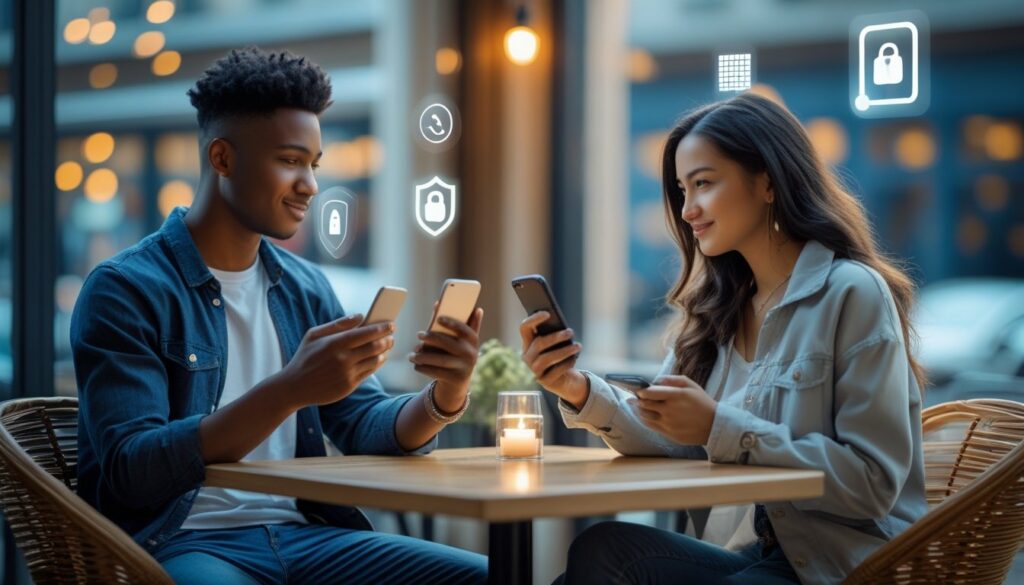Dating has changed a lot in recent years. The old rules don’t always work anymore.
New ways of meeting people and building relationships have replaced them.

Learning these new dating norms helps you build better connections. You can find more meaningful relationships by adapting to the times.
Today’s dating world focuses more on being honest about your needs. You can take things at your own pace.
People value open talks about important topics like mental health and personal space.
1) Setting clear boundaries early on

Set boundaries from the start to save time and stress later. You don’t need to wait weeks to share what matters to you.
Think about your deal-breakers before you start dating. Are you looking for something serious? Do you want kids someday?
Share your boundaries during the first few dates. You might say, “I’m looking for a long-term relationship,” or “I don’t do casual dating.”
Physical boundaries matter too. Tell your date what you’re comfortable with, such as “I like to take things slow” or “I prefer not to stay over yet.”
Communication boundaries are important. Some people text all day, while others prefer phone calls. Figure out what works for both of you.
Don’t feel bad about having standards. The right person will respect your boundaries.
If someone pushes back or ignores your boundaries, move on. They aren’t worth your time.
Boundaries can change as you get to know someone. What matters most is being honest about where you stand right now.
2) Prioritizing mental health conversations

Talking about mental health is becoming a normal part of dating. It used to be taboo, but not anymore.
You don’t have to share your deepest struggles on the first date. Being open about stress, anxiety, or therapy shows you’re self-aware.
When you mention seeing a therapist, you show your date that you work on yourself. This builds trust and shows emotional maturity.
Mental health conversations help you understand each other better. You can learn about their coping skills and stress triggers early on.
Ask simple questions like “How do you handle stress?” or “What helps you feel better on tough days?” These questions feel natural and give real insights.
Share your own experiences too. Maybe you talk about how exercise helps your mood or how you practice mindfulness.
Some people aren’t ready for these conversations, and that’s okay. Timing matters, so save deeper topics for when you both feel comfortable and connected.
3) Using video calls before in-person dates

Video calls have become a smart step in dating. They help you get to know someone before meeting face-to-face.
You can see how someone acts naturally during a video chat. This gives you a better sense of their personality than just texting.
Video dates save you time and money. You don’t need to spend hours getting ready and traveling to meet someone you might not click with.
You’ll feel more comfortable on your first in-person date. Since you’ve already talked face-to-face, there’s less pressure and awkwardness.
Video calls also help keep you safe. You can spot red flags before meeting someone in person.
Trust your gut if something feels off during the call. Try scheduling a 20-30 minute video chat so you have enough time to talk without a big commitment.
Pick a time when you both feel relaxed. Evening calls often work well.
Make sure your internet connection is stable. A smooth call helps set the right tone.
4) Embracing slow dating to build trust

Slow dating means taking your time to get to know someone before jumping into a relationship. You don’t rush into physical intimacy or big commitments.
When you slow down, you can really see who someone is. You learn about their values, habits, and how they treat others.
This approach helps you build real trust. You make better choices about who you date.
Start by having longer conversations before meeting in person. Ask meaningful questions about their goals and interests.
When you meet, focus on activities that let you talk. Try coffee dates, walks, or cooking together instead of just going to movies.
You can also wait longer before becoming exclusive. This gives you time to see how they handle stress and conflict.
Many people find that slow dating leads to stronger relationships. You feel more confident in your choice when you really know your partner.
There’s no perfect timeline. Some couples need weeks, others need months. The key is making sure you both feel comfortable with the pace.
5) Being transparent about dating multiple people

Honesty matters from the start in today’s dating world. You don’t have to keep your dating life a secret.
Being upfront about seeing other people protects everyone involved. You avoid hurt feelings and confusion later.
You don’t need to share every detail. Simply mention that you’re not exclusively dating anyone yet.
Within the first few dates is usually best to bring this up. You can say, “I’m still meeting new people,” or “I’m not ready to be exclusive yet.”
This transparency sets clear expectations. Nobody gets the wrong idea about where things stand.
Being honest doesn’t mean being harsh. You can be kind while still being clear about your intentions.
Many people today expect this kind of openness. It shows respect for the other person’s time and feelings.
If someone can’t handle this honesty, they might not be the right match for you. The right person will appreciate your straightforward approach.
6) Discussing digital privacy openly

Talking about digital privacy is just as important as other boundaries in relationships. It might feel awkward at first, but it’s necessary.
Discuss what you’re comfortable sharing online. Do you want your partner posting photos of you? Are you okay with them tagging you in social media posts?
Social media passwords are another topic. Some couples share them, while others keep them private. Both choices are fine if you both agree.
Think about your digital footprint together. What happens to shared photos if you break up? How do you handle couple posts on Instagram or Facebook?
Location sharing apps can be helpful or invasive, depending on your comfort level. Talk about whether you want to share your location.
Consider your privacy settings on dating apps too. When should you delete your profiles? What about keeping old conversations?
These conversations help you understand each other’s boundaries. They also prevent misunderstandings that could hurt your relationship later.
Digital privacy talks show respect for each other’s comfort zones. They’re part of building trust in today’s connected world.
7) Valuing personal space and alone time

Wanting time alone is normal and healthy. This dating norm is changing fast.
Many people believed good couples spend all their free time together. Now we know that’s not healthy.
You need space to grow as a person. Taking time for yourself makes you a better partner.
When you have your own hobbies and interests, you bring more to the relationship. Your partner should support your alone time, not fight it.
This might mean having separate friend groups or different weekend plans. Some couples spend one night a week apart, while others take solo trips or have separate workout routines.
Find what works for you both. Personal space isn’t about loving your partner less. It’s about staying true to yourself while in a relationship.
When you respect each other’s need for space, you actually become closer. You’ll have more interesting things to talk about when you’re together.
Don’t feel bad about wanting time alone. It’s healthy for any strong relationship.
8) Celebrating non-traditional relationship timelines

You don’t have to follow the same dating script as everyone else. Gone are the days when couples felt pressure to move in together after six months or get engaged within two years.
Your relationship timeline should work for you and your partner. Some couples take five years to say “I love you,” while others move in together after a few weeks.
Maybe you’re focusing on your career right now. That’s okay. Your relationship can grow at whatever pace feels right.
Some people prefer long engagements. Others skip marriage altogether but stay together for decades.
You might date someone for years before becoming exclusive. Or you could be exclusive from day one. Both approaches are valid.
The key is honest communication with your partner. Talk about what you both want and when you want it.
Don’t let family or friends pressure you into their timeline. Your relationship is unique to you two.
Some couples take breaks and get back together. Others never live together but stay committed. There’s no single “right” way to do relationships.
Trust your instincts about timing. You know your situation best.
9) Normalizing singlehood and self-growth

Being single isn’t something you need to fix or rush through. Today’s dating culture sees singlehood as a valuable time for personal development.
You don’t have to apologize for being single. Use this time to discover what you truly want in life and relationships.
Many people now view being alone as an opportunity. You can focus on hobbies, career goals, and friendships without feeling pressure to couple up.
Self-growth matters as much as finding a partner. You might take classes, travel solo, or work on your mental health during single periods.
Friends and family now support your relationship status more than before. They ask fewer questions like “when are you getting married?” and encourage your personal journey.
You get to know your values and boundaries better after spending quality time with yourself.
Being single doesn’t mean you’re missing out. You’re choosing to invest in yourself first.
10) Preferring quality over quantity in interactions

You don’t need to message 20 people every day to find love. Modern dating works better when you focus on fewer, deeper conversations.
Try having real talks with just a few matches. Ask about their hobbies, dreams, or favorite weekend activities.
Quality connections happen when you listen and respond thoughtfully. Read their profile before messaging and ask follow-up questions.
You’ll feel less tired from dating when you aren’t juggling dozens of shallow chats. Your matches will notice the difference.
Pick three to five people you’re genuinely interested in. Give them your full attention rather than spreading yourself too thin.
This approach helps you spot red flags faster. You’ll also build stronger connections that could lead to real dates.
You only need to find one great person. Focus on getting to know someone special instead of having surface-level conversations.
Understanding the Shift: Why Dating Norms Are Changing

Modern dating looks different from what your parents experienced. Social media changes how you meet people, and shifting cultural values shape your expectations.
Cultural Factors Influencing Modern Relationships
Your generation values independence more than earlier ones. This shift changes how you approach dating and relationships.
Career priorities now come first for many people. You might wait until your late twenties or thirties to date seriously.
Gender roles have changed. Women don’t expect men to pay for every date, and you might split bills or take turns paying.
Mental health awareness has grown. You’re more likely to discuss therapy, boundaries, and emotional needs early in relationships.
Diverse family structures are normal now. You might come from divorced parents, single-parent homes, or blended families, which shapes your views on relationships.
Religious influence has decreased for many. You might not feel pressure to marry quickly or follow traditional timelines.
These cultural shifts give you more choices about how to date. They also bring new challenges and expectations.
The Role of Technology in Evolving Expectations
Dating apps have changed how you meet people. Tinder launched in 2012 and now has over 75 million users worldwide.
Technology creates new expectations:
- Instant communication through texting and social media
- Background checks using online profiles and mutual friends
- Photo-first impressions before you talk
You have access to hundreds of potential dates in your area. This can lead to “choice overload.” Many people keep swiping instead of settling.
Video calls became normal during COVID-19. Now, many expect virtual dates before meeting in person.
Social media lets you learn about someone’s life and interests before your first date. This speeds up getting to know each other.
But technology also creates problems. Ghosting happens more easily when someone stops responding to texts. Online dating can feel impersonal compared to meeting someone in person.
Building Authentic Connections in Today’s Dating Scene

Real connections happen when you share your true self and listen to what others need. Today’s dating world values honest talks and flexible ideas about relationships.
Encouraging Open Communication
Open communication starts with asking real questions instead of small talk. Try “What made you smile today?” instead of “How was work?”
You can share your feelings without fear. Say “I felt hurt when you canceled last minute” instead of staying quiet.
Active listening means putting your phone away and focusing on their words. Nod, ask follow-up questions, and repeat what you heard.
Set boundaries early in dating. Tell them if you need space or dislike certain topics.
Good partners respect these limits and share their own needs too.
Be honest about your dating goals. If you want something serious, say so. If you prefer keeping things casual, that’s okay too.
Clear expectations help prevent hurt feelings later.
Redefining What Commitment Means
Commitment doesn’t always mean marriage or moving in together. You can be committed to:
- Exclusive dating without living together
- Supporting each other’s goals while keeping separate lives
- Regular communication without daily texting
- Emotional availability during tough times
Some couples choose different timelines for big steps. You might wait two years before moving in together, while your friends move in after six months.
Both choices work if they fit your needs.
Modern commitment means respecting each other’s independence. You can have separate friend groups and hobbies.
You can also pursue your own career goals while staying devoted partners.
Talk about what commitment looks like for both of you. Maybe your partner values quality time together.
You might show love through small gestures. Understanding these differences helps you both feel secure.




